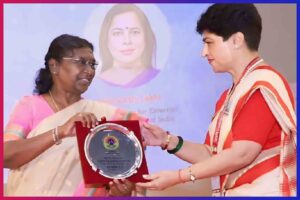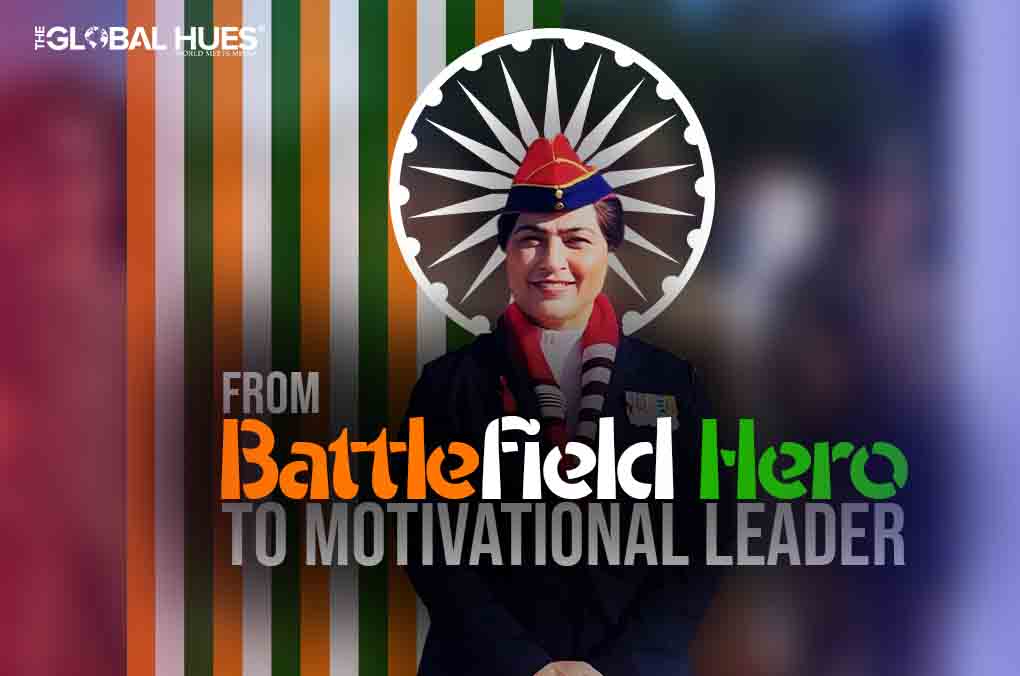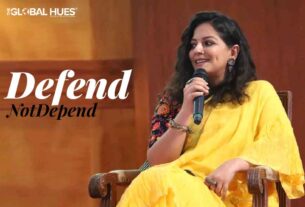Captain Yashika Hatwal Tyagi, famously known as Kargil War Veteran, carries a captivating aura that has the power to instil positivity in everyone she meets. She is not only the first female Army officer posted in the high-altitude area of Leh but is also a recipient of the prestigious President’s Award. Her journey extends beyond the battlefield, as she has embraced her role as a Leadership & Warrior Mindset Coach, Motivational Speaker, and Defence Analyst.
She joined the Indian army in 1994 and took an active part in the Kargil War. During the war, she was in the second trimester of pregnancy. However, this did not diminish her inner strength to fulfil her duty as a daughter of the soil. She successfully supervised the security of logistic installations, ammunition dumps and other sensitive areas with no untoward incident or any security breach.

She is a woman of substance and power. Her extraordinary achievements have broken gender barriers, inspiring countless individuals. There comes a time in everyone’s life when they find their passion and purpose. She is delighted to have found hers. Now, she is a motivational speaker and warrior mindset coach, sharing the lessons she has learned in her life with students, corporates, young professionals, and women. While we delved into a conversation with her, we explored the multifaceted facets of a true military leader, while also understanding how women are establishing themselves in the Indian Army and other sectors.
Reforms are underway in the Indian Army, including the integration of women into the armed forces. Are there any additional reforms required to facilitate women’s participation in the armed forces?
Back in 1994, the news of women joining the army was unheard of. It was absolutely a new domain. The Indian Army initiated the induction of women through the Women Special Entry Schemes (WSES). The scheme lacked permanency. The beginning was with an experiment. It was the time when my generation of women was at the forefront, and the challenges were immense. Fighting biases and stereotypes was the biggest challenge.
The fact that girls were serving in the army was unknown to many. During the Kargil War, women performed very well, leading to the expansion of the scheme and the introduction of the Short Service Commission for women. The Combined Defence Services (CDS) exam became an equal platform for both genders, with identical training terms. Initially, women underwent a training period of only six months, in contrast to the nine months allocated for men. However, this duration was later standardized, making it the same for both genders.
As women had established and proved themselves, they wanted more. Recognizing the contributions of women, the Army decided to bring in a permanent commission for those meeting all criteria. The National Defence Academy (NDA) opened its doors to women, directly inducting them into the Army as permanent commission officers. This streamlined process eliminated the transition from short service to permanent commission.
Today, women who have completed mandatory courses, established themselves in leadership roles and gained diverse experiences in field area tenures and peace area tenures are becoming eligible for appointment as Commanding Officers. The system subjected us to trials, tested our capabilities, and presented challenges that we successfully overcame, proving that women are equally competent. I earnestly hope that, in the future, women will command Nuclear Submarines, fly complete squadron of Rafael and hold posts at Siachen Glacier. This is a long journey yet to be traversed.
How does your military-inspired leadership, derived from your 23 years of experience, resonate with individuals and provide hope, particularly for women?
When you do what you love and convey your thoughts that resonate and are relevant to everyone else, you touch the chords in everyone’s heart. When I go to several corporates and share with them various lessons imbibed through several life lessons learnt in the military, especially with my twenty-three years of experience in leadership roles, I notice a connection. I see people nodding their heads, as military-inspired leadership gives hope to people.
When I share my journey and how I positioned myself in a male-dominated career in the 1990s, it encourages women. Everyone needs to adapt these life lessons to their own situations while preserving the core principles.
Now, the involvement of women has increased in the corporates a lot. Women are taking charge of their lives, becoming independent and more confident. What’s your take on Nari Shakti?
I believe Nari was always a Shakti. Societal stereotypes have confined the perception of a woman’s strength to her home. However, in my perspective, when Nari takes that strength, multitasking, and problem-solving approach to various roles, be it CEOs, soldiers, medical professionals, clerical positions, and more, they position themselves brilliantly.
When people speak of the Army, they think of it as an alpha-male domain. Even heroes in comics are predominantly male, but I am happy to see changing times. It’s crucial to provide more opportunities for women in every domain. Bringing Nari into the corporate sector or any other sector not only adds IQ but also elevates emotional intelligence. Nari Shakti is when a woman believes she can excel in anything, leaving no room for self-doubt. Nari Shakti was always there. However, it was hidden by societal pressure and misconceptions that certain domains were not meant for women. It is essential to take away that doubt and let the women fly.
Message from Captain Yashika Tyagi
Keep moving on and stay resilient. In life, you will have more failures than successes. Never lose heart because success is just a matter of time. Don’t give up. Maintain a never-say-die attitude. Never say it’s over because when you say it’s over, only then it’s over. Keeping moving. Keeping pushing.
Read More Stories:
- Alaknanda Das: The Kathak Genius Who Danced Through Cancer
- Deepa Malik: A Woman With Limitless Spirits
- Aruna Desai: Embracing Motherhood Like No Other
- Ekta Viiveck Verma: The Catalyst For Change In Gender-Based Violence
- Deepika Mhatre: The House-Maid Turned Comedian




